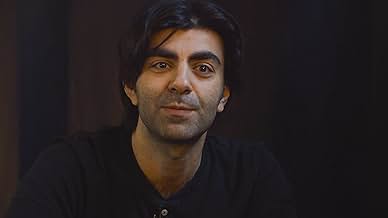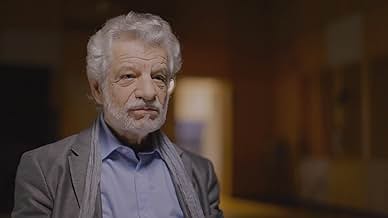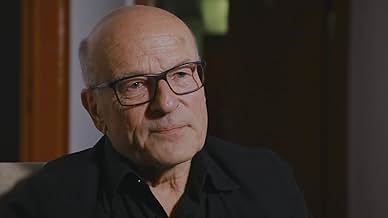Von Caligari zu Hitler: Das deutsche Kino im Zeitalter der Massen
- 2014
- 1 घं 59 मि
IMDb रेटिंग
7.3/10
932
आपकी रेटिंग
अपनी भाषा में प्लॉट जोड़ेंFocuses on the Weimar Republic (1918-1933) and its 'collective spirit' in cinema. The purpose of film as a cultural tool is examined. Based on celebrated sociologist Siegfried Kracauer's sem... सभी पढ़ेंFocuses on the Weimar Republic (1918-1933) and its 'collective spirit' in cinema. The purpose of film as a cultural tool is examined. Based on celebrated sociologist Siegfried Kracauer's seminal book 'From Caligari to Hitler' (1947).Focuses on the Weimar Republic (1918-1933) and its 'collective spirit' in cinema. The purpose of film as a cultural tool is examined. Based on celebrated sociologist Siegfried Kracauer's seminal book 'From Caligari to Hitler' (1947).
- निर्देशक
- लेखक
- स्टार
- पुरस्कार
- 1 जीत और कुल 1 नामांकन
Fritz Lang
- Self
- (आर्काइव फ़ूटेज)
- (वॉइस)
Alfred Abel
- Self
- (आर्काइव फ़ूटेज)
Gertrud Arnold
- Self
- (आर्काइव फ़ूटेज)
Elisabeth Bergner
- Self
- (आर्काइव फ़ूटेज)
Brigitte Borchert
- Self
- (आर्काइव फ़ूटेज)
Bertolt Brecht
- Self
- (आर्काइव फ़ूटेज)
Louise Brooks
- Self
- (आर्काइव फ़ूटेज)
Lil Dagover
- Self
- (आर्काइव फ़ूटेज)
Lya De Putti
- Self
- (आर्काइव फ़ूटेज)
Carl de Vogt
- Self
- (आर्काइव फ़ूटेज)
Marlene Dietrich
- Self
- (आर्काइव फ़ूटेज)
फ़ीचर्ड समीक्षाएं
You'll get to see amazing pictures of 1920s and 30s Berlin and Germany and get to know a few influential movies of the Weimar Republic period of German cinema along with some less known examples in the latter half. Unfortunately the basis for the documentary and narration is based on Siegfried Kracauer's book "From Caligari to Hitler: A Psychological History of the German Film" published in 1947, which is filled with Postmodernist gibberish and sociologist analysis and interpretation through a decidedly Frankfurt School lens describing the time period, directors, other people involved and the movies, often even self-contradictorily so. A few of the interviewees picked also don't seem to hold any deeper insights into the time period and it's questionable what they add to the documentary or for what reason they were chosen.
I'm glad I got to see this, having read Kracauer's book about twelve years ago. It is a bit stuffy and pedantic, but still a marvelous look at a huge period in cinema, the Weimar. We are informed of the movement in Germany that took place after the First World War. Germany, decimated by the restrictions and punishments in Versailles, began to rebuild. The problem was that they were building their future on sand. Meaningless jobs and overpayment for work that really contributed little to the restoration had to have an end. Soon inflation reared its ugly head. Of course, the Jews were going to be blamed. Hitler took care of that. Kracauer's thesis is that the budding film industry predicted the coming of the National Socialist Party. He points particularly to the close knittedness of the youth that were about to be disenfranchised. He asks where they will be in thirty years. Also, many times of the films of the time presented us with megalomaniacs or those of evil intent. Women seemed to be diminished in the films. Also, there was a sort of mob order to the characters. Positives of the documentary are that it is nicely ordered to prove the point. There are numerous clips to support the thesis. I'm greedy, however, and would like to have seen a bit more. Nevertheless, the quality of the clips is quite good. It has led me to take a further look at some of the Fritz Lang and F. W. Murnau films that are seldom seen. I'm glad the TCM has seen fit to do more than show their catalogue of films. Let's hope for even more of these kinds of things.
From Caligari to Hitler: German Cinema in the Age of the Masses (2014)
*** 1/2 (out of 4)
Entertaining documentary that explores German cinema before Hitler came into play. The Weimar Republic is looked at from the span of 1919-1933 and we hear about countless careers including Fritz Lang, F.W. Murnau, Georg Wilhelm Pabst, Ernst Luitsch, Marlene Dietrich, Billy Wilder and Robert Wiene among others.
If you're a fan of German cinema then you'll certainly want to watch this documentary that clocks in just under two hours. There are a lot of clips from various movies shown but we also get interviews with some German historians who discuss these films and their impact around the world. I will admit that some of the narration seemed to try and be "too intelligent" by throwing certain thoughts out there that just didn't really fit with the films.
With that said, there's no question that this gives you a terrific look at German cinema during this period and there are some theories that if you view these films they give you an idea into the mindset of German's and they might explain why Hitler rose to power. Certainly some interesting things to think about. FROM CALIGARI TO Hitler is certainly worth watching.
*** 1/2 (out of 4)
Entertaining documentary that explores German cinema before Hitler came into play. The Weimar Republic is looked at from the span of 1919-1933 and we hear about countless careers including Fritz Lang, F.W. Murnau, Georg Wilhelm Pabst, Ernst Luitsch, Marlene Dietrich, Billy Wilder and Robert Wiene among others.
If you're a fan of German cinema then you'll certainly want to watch this documentary that clocks in just under two hours. There are a lot of clips from various movies shown but we also get interviews with some German historians who discuss these films and their impact around the world. I will admit that some of the narration seemed to try and be "too intelligent" by throwing certain thoughts out there that just didn't really fit with the films.
With that said, there's no question that this gives you a terrific look at German cinema during this period and there are some theories that if you view these films they give you an idea into the mindset of German's and they might explain why Hitler rose to power. Certainly some interesting things to think about. FROM CALIGARI TO Hitler is certainly worth watching.
Informative documentary about the cinema of the Weimar Republic
Based on Siegfried Kracauer's work "From Caligari to Hitler", the film journalist Rüdiger Suchsland presents a portrait of German cinema during the Weimar Republic that is well worth seeing. This era is rightly considered the most important in German film history. Suchsland substantiates the many theses he put forward through numerous well-selected film excerpts. In addition to Kracauer, he also refers to Lotte Eisner and her work "Die dämonische Leinwand / The Demonic Screen" and to the legendary director Fritz Lang, whose voice can be heard in numerous archive recordings.
Fortunately, only five contemporary experts have their say in the already extensive documentation, but they have important things to contribute: the film scholars Elisabeth Bronfen, Thomas Elsaesser, Eric D. Weitz and the directors Fatih Akin (GOLDEN GLOBE 2018 for AUS DEM NICHTS / IN THE FADE) and Volker Schlöndorff (ACADEMY AWARD 1980 for DIE BLECHTROMMEL / THE TIN DRUM).
Two films from the huge number of examples mentioned deserve special mention because they do not necessarily belong to the established canon: "BRÜDER / Brothers" (1929) by Werner Hochbaum and "Nerven / Nerve" (1919) by Robert Reinert, two films that may still be are discovered.
This documentary is worth it!!!
Based on Siegfried Kracauer's work "From Caligari to Hitler", the film journalist Rüdiger Suchsland presents a portrait of German cinema during the Weimar Republic that is well worth seeing. This era is rightly considered the most important in German film history. Suchsland substantiates the many theses he put forward through numerous well-selected film excerpts. In addition to Kracauer, he also refers to Lotte Eisner and her work "Die dämonische Leinwand / The Demonic Screen" and to the legendary director Fritz Lang, whose voice can be heard in numerous archive recordings.
Fortunately, only five contemporary experts have their say in the already extensive documentation, but they have important things to contribute: the film scholars Elisabeth Bronfen, Thomas Elsaesser, Eric D. Weitz and the directors Fatih Akin (GOLDEN GLOBE 2018 for AUS DEM NICHTS / IN THE FADE) and Volker Schlöndorff (ACADEMY AWARD 1980 for DIE BLECHTROMMEL / THE TIN DRUM).
Two films from the huge number of examples mentioned deserve special mention because they do not necessarily belong to the established canon: "BRÜDER / Brothers" (1929) by Werner Hochbaum and "Nerven / Nerve" (1919) by Robert Reinert, two films that may still be are discovered.
This documentary is worth it!!!
Focuses on the Weimar Republic (1918-1933) and its 'collective spirit' in cinema. The purpose of film as a cultural tool is examined. Based on celebrated sociologist Siegfried Kracauer's seminal book 'From Caligari to Hitler' (1947).
As someone who loves Kracauer's book and the Weimar period of German cinema, this documentary was a godsend. I would have preferred it was dubbed rather than subtitled, but that is a small matter (and one that should not even bother me considering how many of the films referenced are subtitled).
Do I think the films of the 1920s predicted the rise of Hitler? No. But I absolutely love the exploration of them and German culture. The book has more detail than a film could hope to cover in 90-120 minutes, but the film brings everything to life. The clips are good (some of these films are hard to find), but even just daily life in Germany... very nice.
As someone who loves Kracauer's book and the Weimar period of German cinema, this documentary was a godsend. I would have preferred it was dubbed rather than subtitled, but that is a small matter (and one that should not even bother me considering how many of the films referenced are subtitled).
Do I think the films of the 1920s predicted the rise of Hitler? No. But I absolutely love the exploration of them and German culture. The book has more detail than a film could hope to cover in 90-120 minutes, but the film brings everything to life. The clips are good (some of these films are hard to find), but even just daily life in Germany... very nice.
क्या आपको पता है
- ट्रिविया[Suchsland on Von Caligari zu Hitler: Das deutsche Kino im Zeitalter der Massen (2014)] Youth, freedom, irony, curiosity: Weimar is Modernity at its best and 'the' time of German cinema: By far the prime and richest period of our filmmaking. Cinema mirrors the turbulent era of the Twenties. These movies had it all! But more or less everything of it is forgotten, reduced to two or three footnotes. I wanted to take us all on an adventurous trip to this lost time, a trip which should entertain, move, surprise and remind us all of an open wound in our past. Siegfried Kracauer, a forgotten genius of cultural critique, is the perfect guide to an era, which is fascinating in its contradictions. This fascination and, yes: my love for this time and its cinema, I hope to share.
- कनेक्शनFeatures Die Augen der Mumie Ma (1918)
- साउंडट्रैकBerlin: Symphony of a Metropolis (Berlín. Die Sinfonie der Großstadt)
Composed and conducted by Timothy Brock
Performed by Washington Chamber Orchestra
टॉप पसंद
रेटिंग देने के लिए साइन-इन करें और वैयक्तिकृत सुझावों के लिए वॉचलिस्ट करें
विवरण
- रिलीज़ की तारीख़
- कंट्री ऑफ़ ओरिजिन
- आधिकारिक साइटें
- भाषाएं
- इस रूप में भी जाना जाता है
- From Caligari to Hitler: German Cinema in the Age of the Masses
- फ़िल्माने की जगहें
- उत्पादन कंपनियां
- IMDbPro पर और कंपनी क्रेडिट देखें
- चलने की अवधि1 घंटा 59 मिनट
- रंग
- पक्ष अनुपात
- 1.78 : 1
इस पेज में योगदान दें
किसी बदलाव का सुझाव दें या अनुपलब्ध कॉन्टेंट जोड़ें
































